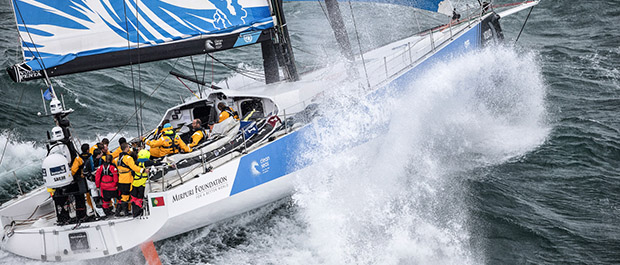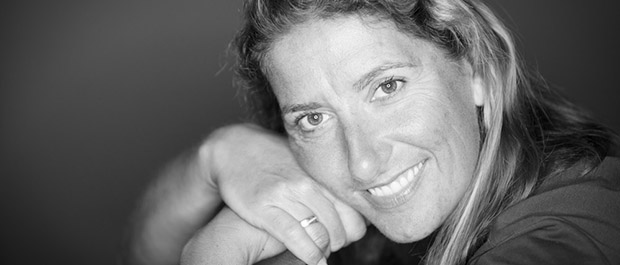
The Volvo Ocean Race is the world’s premier offshore race, an exceptional test of sailing prowess and human endeavour, which started over 37 years ago as the Whitbread Round the World Race.
Crews experienced life at the extreme as they raced day and night for more than 20 days at a time, combating the harshest weather conditions the planet can offer.
The 2017/18 Volvo Ocean Race promised to be one of the closest in the history of the event with seven teams taking part.
There had never been a race like it over the 45-year life of the race. At the conclusion of 126 days of racing, the winning margin was just 16 minutes.
Dee Caffari MBE competed in her second consecutive Volvo Ocean Race, skippering the ‘Turn the Tide on Plastics’ team (she competed on Team SCA in 2014-15). She was the only female skipper in the race and the only skipper to choose a 50-50 male/female crew combination for her multinational team.

The team’s guiding mission was to amplify United Nations Environment’s ‘Clean Seas: Turn the Tide on Plastic’ campaign throughout the eight months of the race.
The groundbreaking science element of the Sustainability Programme mapped microplastic pollution.
Only three of the 75 samples collected during the race, south of Australia, east of Argentina and west of Ireland, have been found to contain no microplastics.
The highest levels of microplastic, 349 particles per cubic metre, were found in a sample taken in the South China Sea that feeds into the Kuroshio Current and the North Pacific Gyre. The second highest, 307 particles per cubic metre, came close from the point where the Mediterranean Sea and Atlantic Ocean meet (Strait of Gibraltar).
Even close to Point Nemo, the furthest place from land on Earth, where the nearest humans are on the International Space Station, between nine and 26 particles of microplastic per cubic metre were recorded.
Microplastics are often invisible to the naked eye and can take thousands of years to degrade. By collecting information on their levels, the Science Programme is helping scientists gain insight into the scale of plastic pollution and its impact on marine life.
The race started from Alicante, Spain on 22 October, 2017 and finished on 24 June 2018.
Sadly sailor John Fisher from Southampton, was reported overboard in the Southern Ocean off Sun Hung Kai / Scallywag early on Monday 26 March 2018.
Richard Brisius, the President of the Volvo Ocean Race said: “I am extremely sad to inform you that one of our sailors, John Fisher, from Team Sun Hung Kai/Scallywag, is now presumed to have been lost at sea.
This is heart-breaking for all of us. As sailors and race organisers losing a crew member at sea is a tragedy we don’t ever want to contemplate. We are devastated and our thoughts are with John’s family, friends and teammates.”
“This is the worst situation you can imagine happening to your team,” said SHK/Scallywag Team Manager Tim Newton.
Route and results for Turn the Tide on Plastic
Leg 1 (Alicante to Lisbon starting 22 October 2017) – Position: 7th
Leg 2 (Lisbon to Cape Town starting 5 November 2017) – Position: 7th
Leg 3 (Cape Town to Melbourne starting 10 December 2017) -Position: 6th
Leg 4 (Melbourne to Hong Kong starting 2 January 2018) – Position: 6th
Leg 5 (Hong Kong – Guangzhou – Hong Kong starting 5 February 2018) – transitional leg.
Leg 6 (Hong Kong to Aukland starting 7 February 2018) – Position: 5th
Leg 7 (Aukland to Itajai starting 18 March 2018) – Brazilian stopover – Position: 4th
Leg 8 (Itajai to Newport starting 22 April 2018) – Position: 6th
Leg 9 (Newport to Cardiff starting 20 May 2018) – Position: 6th
Leg 10 (Cardiff to Gothenburg starting 10 June 2018) – Position: 5th
Leg 11 (Gothenburg to The Hague starting 21 June 2018) – Position: 5th
Overall position: 6th